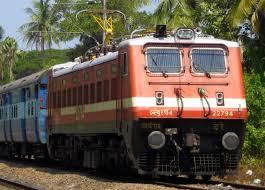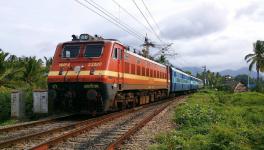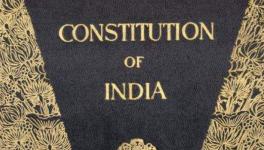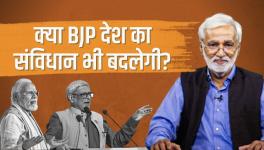Debroy Committee Report: Following the Neo-liberal Play Book
The Report of the Debroy Committee for restructuring of Indian Railways has predictably recommended unbundling of IR and its privatization in all but name. The Report, as well as signed articles and press statements by Committee Chairman and Niti Ayog member Bibek Debroy himself, prefer the term “liberalization,” interpreting privatization strictly as sale of equity which the Report does not envisage. In further quibbling with words, the Report also takes pains to assert that the radical proposal for entry of private operators in running of trains is only “ad hinc” (this point forward) rather than “ab initio” (new), since private players are already involved in, for example, container services, freight wagons and freight trains.
But why is Bibek Debroy so coy? Is he defensive in anticipation of criticism? Mrs.Margaret Thatcher, then Conservative British PM of Great Britain who initiated the privatization of British Rail in 1993 through a model the Debroy Committee is clearly influenced by, heralding a wave of privatizations and other neo-liberal policies in the UK and across the advanced capitalist countries, had no such hesitation in calling a spade a spade.

Image Courtesy: commons.wikipedia.org
The Debroy Committee has in fact taken small steps back from its Interim Report which was more brashly inclined to a surgical dismemberment of various functional wings of the Railways with a clearer demarcation between state-owned and private entities. In the Final Report, it suggests a more step by step approach, and is not averse to the idea of having both types of operators in different sub-sectors. Nevertheless, the basic idea of the Debroy Committee remains the same: hive off different functional operations, especially running of trains, and open them up to private players. If experience in other sectors in India is anything to go by, such a shift in favour of the private sector, especially with prodding by a friendly regulator, will generate its own momentum propelling a dominant role for corporates, including foreign companies as now permitted. This is privatization, make no mistake.
Ideological prescription Criticism of the Report and the thrust of its recommendations will undoubtedly be dismissed by the Committee members, the BJP government and its corporate and other cheerleaders as knee-jerk reactions by the Left or as emanating from antiquated ideas of the Nehruvian-socialist era. The shoe is actually on the other foot. The Report’s prescriptions and their rationale are doctrinaire, formulaic neo-liberal prescriptions mistakenly blaming all ills on state ownership and holding up privatization as the cure for all ailments. This is clear from the fact that the Report, while appending a chapter with brief descriptions of railway restructuring in several countries, drawn few lessons from them, especially the disastrous outcomes from privatization of British Rail, and lessons that could be drawn instead from diversity of rail transport models in Europe and elsewhere.
The Report calls for unbundling of Indian Railways, separating track construction and maintenance as the main function of a rump entity (called IR in the Report) from production of rolling stock and operation of trains, both opened up to private parties, and hiving off or outsourcing most other “non-core” activities including railway security, and medical, educational and housing services for employees. In order to prepare for this enormous and complex task, the Report calls for several preparatory steps to be taken over a five-year period.
First is a shift to commercial accounting practices, which the Report expects would unveil the true viability of different operations including social costs of particular services or routes. The Report recommends that social service obligations (which the Report curiously abbreviates as PSO!) should be cleanly separated from commercial considerations and any subsidy required should be paid by the Government from the Union Budget rather than borne by IR. Second, an “independent” Regulator would be supposedly ensure fair competition, set technical standards and safety regulations, determine tariffs and infrastructure access fees to be paid by private train operators. The Report suggests that the Government Railway police be entirely funded by State Governments as against 50% by the Railways at present, while decentralized IR managers be given the option of using either the Railway Protection Force or private security agencies. As with SSOs, the Report suggests that IR could subsidize education and medical care at private institutions, as is increasingly being done by Government and PSU employees at huge cost while undermining the public health and education systems. All these measures closely follow the neo-liberal play book: all expenditures on infrastructure to be incurred by the State, all consequently high profits from operations go to private players.
Whatever the claims in theory, experience in India has shown how this works in practice, for example in privatization of electricity distribution. The Regulator is anything but “independent,” mandated specifically to promote and support private distribution companies (discoms), and tilt the balance heavily in their favour. Spurious “commercial accounting” is notorious, especially for non-transparent deductions for infrastructure expenditures, but are accepted by regulators at face value for determining (usually high) tariffs. Discoms are scarcely accountable, regulators even disallowing CAG audits, and consumers are simply ignored as stakeholders, leaving the State to subsidize them if it wants (as the Delhi Government did). Private monopolies can be far worse than public ones!
There is no reason to believe this pattern will not repeat itself in privatization of IR. The Debroy Committee Report explicitly addresses this apprehension, but only baldly states that all will be well with the Railway Regulator. On the contrary, it can safely be predicted that costs of private operators will always be shown as high, requiring escalating tariffs, as is being witnessed with private electricity distribution. Non-profitable routes will be mercilessly slashed, regardless of social needs, and one can only wonder at the fate of the over 90% of rail passengers who today use ordinary sleeper or unreserved carriages for their journeys. Their fate will be left to the rump IR, costs to be borne by the State, meaning the taxpayer. All infrastructure investments and maintenance will be left to the State, with low “regulated” access charges. When the dust settles on privatization, or liberalization if you prefer, users will have to pay much more, the State will end up with higher expenditures than in the “bad old days,” and private operators will laugh all the way to the bank!
Failed privatization in Britain Lest anyone thinks this is a paranoid vision, let us look at privatization of British Rail, the role model for the Debroy Committee, as brought out by independent studies including some sponsored by the UK government.
The autonomous state-owned corporation, Railtrack plc, set up in 1993 to manage infrastructure, collapsed in 2001 under the weight of high expenditure and poor recoveries from private train operators. Its successor, Network Rail, saw its debt burden rise from about £9,600 million in 2002-3 to about £30,000 million in 2012, with interest payments exceeding track maintenance expenses. Track access charges were continually lowered upon demands by the private operators, further reducing incomes. Following EU principles, the entire debt burden was later transferred to the State budget. Today UK taxpayers bear double the burden they did before privatization!
2363 stations and 266 routes, roughly one-third of the rail network in Britain, were closed as unprofitable. Passenger services are expensive yet poor, with passenger services especially for office commuters are overcrowded often with standing room only, and private operators do not add more trains, piling on profits while passengers pile on to each other! On average, British fares are today 30% higher than in continental Europe where many rail services such as in France and Germany are run by State-owned corporations which, incidentally, also operate more than half the rail services in the UK! As one wag put it, Thatcherite orthodoxy demands that the British State cannot operate rail services in the UK, but any other State can!
Ironically, and fatally undermining the neo-liberal dogma, the only State-run rail service left in the UK, East Coast Rail, is among the most profitable! It consistently requires less state subsidy than any of the other 15 privately-owned franchises, and has contributed a handsome £1 billion to the exchequer between 2009 and 2014, in a period when the 5 most expensive private franchises absorbed subsidies of over £3 billion! So embarrassed is the the Conservative government at the success of the publicly-owned franchise, that it is hell bent on privatizing it! A YouGov poll showed 68% of UK citizens favouring the return of a nationalized British Rail. And in the Scottish referendum, one of the popular campaigning points of the pro-independence side was a re-nationalization of railways in Scotland!
Many models of restructuring Admittedly there is a lot wrong with Indian Railways. There is indeed ample scope for restructuring, operational efficiencies and safety, an aspect totally and surprisingly ignored by the Debroy Committee. Considerable good may also come from participation of private players in a variety of services and even in manufacture of rolling stock. But such restructuring needs to be done pragmatically, with an open mind, taking recourse models that are best suited to Indian conditions and requirements, especially of passengers with low paying capacity, rather than through ideologically-inspired prescriptions. The Debroy Committee’s treatment, copying the failed British privatization model, would be worse than the disease.
One may be surprised at the numerous models that exist for restructuring of rail transportation services which has been seen to be required the world over in the past three decades or so due to changing nature of the economy, competition from different modes of transportation, and changing needs of passengers and for movers of goods.
In Germany, for instance, the main motivation was to bring more traffic of both passengers and goods to the railways, especially on regional routes, after huge inroads by road transport. This is a familiar problem in India where the rail to road ratio has virtually reversed in the past five decades to the detriment of the former. Mounting fuel costs, local air pollution and the need to reduce emissions for a low-carbon pathway all call for sharply increasing the share of railways in the transportation mix in India. Germany opted for unbundling the monolithic Deutsche Bahn (German Rail) into two state-owned entities, DB Netz for infrastructure and DB AG for operations, especially inter-city passenger services including the highly successful high-speed rail service ICE. DB AG includes DB Regio for regional passenger services and DB Schenke for freight, which competes with private operators in an open-access system and also operates in several other European countries including in the UK.
In Holland, state-owned Netherlands Railways is the biggest operator and holds a monopoly over long-distance services. In France, the trend towards privatization has been reversed by the current Socialist government, resisting huge pressures from French multinational Veolia which operates in many EU countries. SNCF, which too had been split between infrastructure and operations entities, remains the only operator and is slowly re-integrating the two arms, synergies being seen as promoting efficiencies rather than detracting from them. SNCF efficiencies and costs have responded well to forms of social control other than competition, such as from the substantial decentralization to provincial governments and the stiff terms secured by them.
Decentralization has also produced good results in Spain where, for example, the left-leaning government in the Basque region runs its own passenger railway, Euskotren, with new locally-built rolling stock, track doubling and new stations. Italy, while following the de-regulation model under which the state-owned railway Trenitalia faces competition on inter-city routes from private operators, also has several publicly-owned vertically-integrated regional railways with rolling stock owned by provincial councils. In Scandinavia too, unbundling of infrastructure from operations has worked well, but with mostly state-owned entities and highly decentralized operations run by community-owned local railways or by provincial authorities.
Unfortunately, the EU is pushing the neo-liberal dogma and may even legislate mandatory competition in all EU member countries. This despite a European Commission report admitting that evidence supporting the benefits of privatization or de-regulation is “ambiguous” and describing compulsory tendering as a “political choice.”
Many models like the ones cited above of efficient, accountable and publicly-owned railway systems could have been studied and even drawn upon by the Debroy Committee but, unfortunately, it has chosen to go down the neo-liberal path and accepting the privatization dogma. The Modi government would do well to reject the Debroy Committee Report, but probably will not, with an eye on cheers from the stock market and from foreign investors. That comes from looking upon the railways as an economic rather than public good, and from putting profits before people.
Disclaimer: The views expressed here are the author's personal views, and do not necessarily represent the views of Newsclick
Get the latest reports & analysis with people's perspective on Protests, movements & deep analytical videos, discussions of the current affairs in your Telegram app. Subscribe to NewsClick's Telegram channel & get Real-Time updates on stories, as they get published on our website.
























